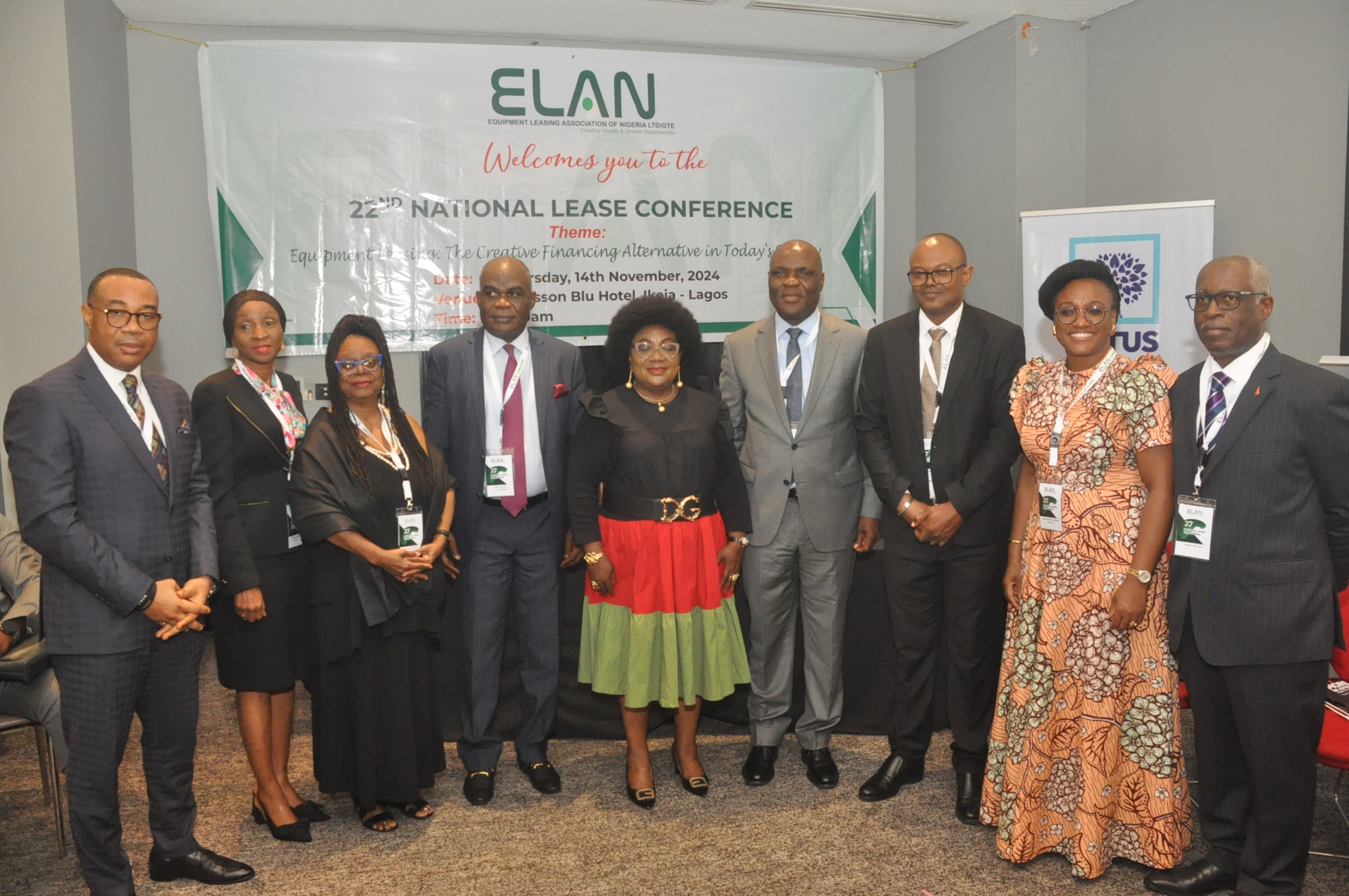
WELCOME ADDRESS BY EHIGIAMUSOE ELIZABETH NGOZI (MRS), CHAIRMAN, BOARD OF DIRECTORS, EQUIPMENT LEASING ASSOCIATION OF NIGERIA (ELAN) AT THE 22ND NATIONAL LEASE CONFERENCE HELD ON THURSDAY, 14TH NOVEMBER 2024 AT RADISSON BLU HOTEL, IKEJA LAGOS.
The Registrar/CEO, Equipment Leasing Registration Authority
Distinguished Special Guests
Esteemed Guest Speakers and Panellists
Directors and Members of ELAN
Gentlemen of the Press
Ladies and Gentlemen,
On behalf of the Equipment Leasing Association of Nigeria (ELAN), I am delighted to welcome you to the 22nd Annual National Lease Conference organised by ELAN. I am especially honoured to welcome our Special Guests, esteemed Guest Speakers/Panellists, and other dignitaries. We sincerely thank you for creating time to honour our invitation despite your very busy schedules.
This event is the biggest annual leasing gathering that brings together industry experts, policymakers, and other stakeholders to explore the potential of equipment leasing as a dynamic and innovative financing alternative, discuss pertinent issues affecting the development of the leasing industry and the economy at large, as well as fostering collaboration and networking among stakeholders.
The theme for this year’s event “EQUIPMENT LEASING: THE CREATIVE FINANCING ALTERNATIVE IN TODAY’S REALITY” is intended to highlight the developmental attributes and imperatives of equipment leasing to stimulate production and create wealth to enhance the overall capacity of the economy during this critical period in our nation’s history.
The Nigerian economy has been walking on its knees for some time now, as major indicators showed adverse performance, against the background of global economic uncertainties, geopolitical tensions, and the continued impact of the COVID-19 pandemic as well as increasing domestic macroeconomic vulnerability. The twin cardinal policies of the Federal Government – the subsidy removal and floating of the Naira, hailed as bold reforms in taking the economy out of the woods, have equally brought considerable hardship in the land, with astronomical increases in the cost of goods and services.
In the financial space, the Central Bank of Nigeria’s (CBN) continued increase in the Monetary Policy Rate (MPR), which aims to curb inflation, seems to be achieving limited positive results as the price indices remain high. The recent increase of the MPR to 27.25%, implies that the cost of borrowing will increase to around 40% thus, further constraining businesses and consumer spending.
The Government, however, continues to re-echoe its economic agenda “the Renewed Hope Agenda “aimed primarily to revamp the economy and improve the quality of lives of Nigerians. The government must be proactive and adopt value-added initiatives that facilitate the speedy attainment of the agenda. One such initiative is Equipment Leasing. Essentially, leasing can play a major role in facilitating the various developmental initiatives, ranging from access to capital for individuals and businesses, food security; poverty eradication, inclusive growth, and job creation to supporting initiatives in transportation including that of the CNG vehicles.
Indeed, Leasing has been established globally as the creative financing alternative, generating an annual average of over $1.5 trillion in new business volume and contributing about 1.5% to global GDP. In Nigeria, since its inception leasing has been supporting economic development. Today, the impact of leasing is pronounced in all sectors of the economy, enhancing capital formation, generating employment, and creating wealth. Outstanding leases in Nigeria in 2023 amounted to N4.19trn as against N3.25trn in 2022 representing 28.7% growth and has contributed more than N20.4 trillion to capital formation in the economy.
Leasing remains a compelling alternative as we navigate the complexities of our challenging economy, offering efficient and flexible financing solutions to meet the diverse needs of the user. This is a very important tool for businesses, especially the Micro Small, and Medium Scale Enterprises (MSMEs), empowering them to acquire the assets they need to grow and thrive amid increasing costs.
Development partners like the World Bank and governments around the globe have been advocating and utilising leasing to finance critical assets across various sectors of the economy, ranging from transport, power, agriculture, and mining to medical infrastructure. In Kenya for example, the government has been using leasing for official government transport, aimed at delivering efficient and economically viable transport solutions across various governmental departments. The initiative has not only revolutionised governmental transport operations but has also yielded substantial impacts on employment and the local automotive industry, boasting a fleet of over 8,000 vehicles and generating 1,813 employment opportunities, while indirectly supporting an estimated 100,000 jobs.
In today’s reality in Nigeria, where there is a need for resource optimisation, all tiers of government should deepen their participation in public sector leasing. This model conserves capital and provides flexibility, enabling public entities to access essential equipment, technology, and infrastructure without significant upfront investment, leading to cost savings and avoidance of waste. By reallocating capital from asset acquisition to more strategic endeavour, governments can maximise their impact and deliver greater value to the citizenry.
While encouraging the government and businesses to embrace leasing given its significant developmental attributes to the economy, it is crucial that key stakeholders, especially the Government, strengthen their support for the industry to harness its full potential. For instance, the enactment of the Equipment Leasing Act 2015, has ushered confidence in the industry and is expected to stimulate more investment. It is gladdening to note that, the Equipment Leasing Registration Authority (ELRA) established by the Act to support its implementation, will soon come into full swing. What to add is that, ELRA must be proactive and support the development of the Nigerian Leasing industry. Also, the issue of appropriate funding mechanisms for the industry remains a growing concern. We continue to engage private financiers in this regard while reiterating our call on the Government to allow leasing access to the various intervention funds. Indeed, by working together, we can drive the growth and development of the leasing industry in Nigeria.
Distinguished Ladies and Gentlemen, the stage is set to take this conversation further. I am confident that this conference will stimulate insightful discussions, generate innovative ideas, and contribute to the advancement of equipment leasing as a powerful tool for economic growth and development. I encourage all of us to engage actively in the sessions, share experiences, and build lasting partnerships.
Finally, I express once again my sincere gratitude to the speakers and sponsors for their invaluable contributions to this event. I also extend my heartfelt appreciation to all of you for taking the time to attend.
Welcome to the 22nd National Lease Conference. I wish us a fruitful engagement.
Thank you.
Ehigiamusoe Elizabeth Ngozi (Mrs)
CHAIRMAN, BOARD OF DIRECTORS

